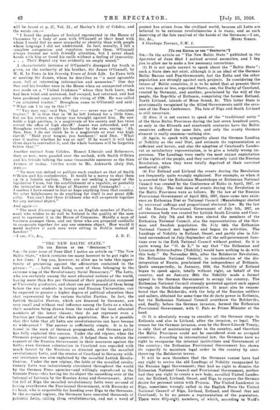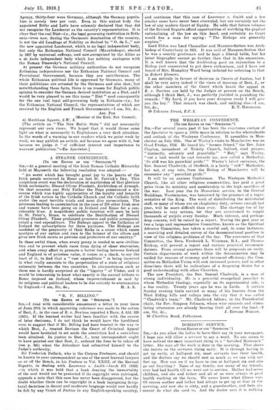[To THE EDITOR OP THE " SPECTATOR:1 Sra,—In the article
on " The New Baltic State" published in the Spectator of June 22nd I noticed several anomalies, and I beg you to allow me to make a few necessary corrections.
(1) It is not quite correct to speak about the "Baltic State"; such a State does not exist, although it is an ideal of the German Baltic Barons and Pan-Germanists, but the Esths and the other population are strongly against such projects. In considering the future of Baltic countries, it is to be noted that at present there are two, more or less, organized States, one, the Duchy of Courland, created by Germany, and another, proclaimed by the will of the people, the Republic of Esthonia, comprising the former Estland, North Livland, islands of Moon Sound, &e. This latter State is provisionally recognized by the Allied Governments until the occa- sion of the Peace Conference. The fate of Riga and South Livland is still uncertain.
(2) Also, it is not correct to speak of the " traditional unity " of the three Baltic Provinces during the last seven hundred years, as only in the fifteenth and nineteenth centuries have the Baltic countries suffered the same fate, and only the scanty German element is really common—nothing else.
(3) Again, to speak with sympathy about the German Landtag of Nobility as the real Diet, and estimate its representation as sufficient and heroic, and also the adoption of Courland's Landes- rat as satisfactory representation, is to give a totally wrong im- pression. The Landtags were really the most unjust exploitation of the rights of the people, and they survived only until the Russian Revolution, when they were totally deprived of their survived mediaeval rights.
(4) For Estland and Livland the events during the Revolution are frequently quite wrongly explained. For example, as when it is asserted that the Esthonian Maanaukogu or Esthonian National Council was created by the Conference of Esths in April, 1917, or later in July. The real dates of events during the Revolution in the Baltic Provinces were as follows. By the law of the Russian Provisional Government of April 12th, 1917, there came into exist- ence an Esthonian Diet or National Council (Maandukogu) elected by universal suffrage and proportional electoral law. By the law of the Russian Provisional Government of July 5th, 1917, an autonomous body was created for Lettish South Livonia and Cour- land. On July 7th and 8th were elected the members of the Esthonian National Council, also the representatives of the Ger- man and Swedish population. On July 14th the Esthonian National Council met together and began its activities. The Landtags of Nobility in Estland, Oessel, and partly also in Liv- land surrendered its July/September all the self-government func- tions over to the Esth National Council without protest. So it is quite wrong for "0. de L." to say that "the Esthonian and Livonian Bitterschaften [Nobility] would have nothing to do with this body." On November 28th, after the Bolshevist Revolution, the Esthonian National Council, in consideration of the dis- integration of Russia, proclaimed the independence of Esthonia. Quite unexpectedly, in January, 1918, the Nobility of Estland began to speak again, totally without right, on behalf of the country, and on January 28th the Nobility made a formal appeal to the German Government to occupy the country., The Esthonian National Council strongly protested against such appeal through its Stockholm representative. It must also be remem- bered that the Bolsheviks, with the help of the Russian soldiers and sailors, obtained for some time the de facto power in Esthonia, but the Esthonian National Council overthrew the Bolsheviks, and, finally, before the German invasion, formed the Esthonian Provisional Government, with C. Pats as Prime Minister at the head.
(5) It is absolutely wrong to consider all the German steps in Esthonia and also in Livland, after the invasion, as legal. The reason for the German invasion, even by the Brest-Litovsk Treaty, is only that of maintaining order in the country, and therefore the Baltic Provinces could not be considered even as occupied countries. According to international law, the Germans have no right to reorganize the internal institutions and Government of the country; the Esthonian Provisional Government has shown its capacity to maintain legal order in the country by over- throwing the Bolshevist terror.
It will be seen therefore that the Germans cannot have had any right to revive the old Landtags of Nobility reorganized by the Russian legal Government; they had no right to dismiss the Esthonian National Council and Provisional Government, neither had they any right to create a new body, so-called United Landes- rat, for Estland, Livland, Oessel, and Riga to express the German desire for personal union with Prussia. The United Landesrat in Riga, sometimes wrongly called in the English Tress -the United National Council of Riga, Livland, Estland, and Oessel (but not Courland), is by no imeans a representation of the population. There were fifty-eight members, of which, according to Wolff's Agency, thirty-four were Germans, although the German popula- tion is merely four per cent. Even in this -unjust body the appointed Esths and Letts have solemnly declared that they did not recognize the Landesrat as the country's representation. It is clear that the real Diet—i.e., the legal governing institution in Beth- onia—even now, during the Germanic domination of the country, is not the old Landtags of Nobility as desired by "0. de L.," nor the new appointed Landesrat, which is no legal independent body, but only the Esthonian National Council (Maanoukogn), elected in 1917 by universal suffrage, and now.recognized by the Allies as a de facto independent body which has nothing analogous with the Roman Dmowsky's National Council.
At present the German military authorities do not recognize Esthonian independence nor the Esthonian National Council and Provisional Government, because they are anti-German. The whole Esthonian political life is oppressed by Germans, many of their politicians are arrested by the Germans and also shot;. but notwithstanding these facts, there is no reason for English public opinion to consider the German desired institution as a Diet, and I would be very pleased 'to see this name " Diet " used consequently for the one real legal self-governing body in Esthonia—i.e., for the Esthonian National Council, the representatives of which are received by the English and French Governments.—I am, Sir, &c.,
ANT. Pin.
(Member of the Esth. Nat. Council).
45 Markham Square, S.W. 3.
[The article on " The New Baltic State " did not necessarily represent our own views. We hoped that it would throw some light on what is necessarily to Englishmen a very dark situation. In the words of a warning to our readers which we print week by week, we may publish an article, not because we agree with it, but because we judge it " of sufficient interest and importance to warrant publication."—En. Spectator.]



























 Previous page
Previous page